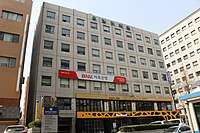Progressive Party (South Korea, 2017)
The Progressive Party (Korean: 진보당; Hanja: 進步黨; RR: Jinbodang) is a political party of South Korea. The party was formed by the merger of the New People's Party and People's United Party on 15 October 2017.[12][13] Originally, the name Minjung Party (Korean: 민중당; Hanja: 民衆黨; RR: Minjungdang) was used, but the name was changed to the Progressive Party from June 2020.[14]
Progressive Party 진보당 | |
|---|---|
 | |
| Permanent President | Kim Jae-yeon |
| President | Collective leadership |
| Floor Leader | Kim Jong-hoon |
| Secretary General | Hong Sung-kyu |
| Founded | 15 October 2017 |
| Preceded by | Unified Progressive Party (de facto) New People's Party People's United Party |
| Headquarters | 11, Yeouidaebang-ro 67-gil, Yeongdeungpo District, Seoul |
| Ideology | Progressivism[1][2] Anti-imperialism[3][4][5] Korean nationalism[3][6] Direct democracy[3][7] |
| Political position | Left-wing[8][9] to far-left[10][11] |
| Colours | Orange |
| Seats in the National Assembly | 0 / 300 |
| Seats within local government | 11 / 3,750 |
| Website | |
| minjungparty | |
| Progressive Party | |
| Hangul | 진보당 |
|---|---|
| Hanja | |
| Revised Romanization | Jinbodang |
| McCune–Reischauer | Jinbodang |

History
The party initially had two members in the National Assembly, both from Ulsan, but was reduced to one on December 22, when the supreme court convicted Yoon Jong-oe for breaking the campaign law.[15]
In July 2018, members of the Minjung party met with members of the North Korean Social Democratic Party in China. The meeting was not authorized by the Ministry of Unification which could have punished the party of violations of South Korea's National Security Act, Jung Tae-heung the co-chair of the Minjung Party stated that he was warned the party may be fined for the meeting.[16]
In August 2019, the party held events related to nationwide protests against Japanese prime minister Shinzo Abe and boycott against Japanese products.[17]
In January 2020, the Minjung party surveyed at 1.5% approval rating ahead of parliamentary elections.[18]
The party lost its remaining seat in the 2020 legislative election.
Controversy
The merger of the New People's Party and People's United Party has been controversial, due to their status as parties that were largely a continuation of the Unified Progressive Party, which was dissolved and banned in 2014 due to purported "anti-constitutional" activity by a Constitutional Court ruling.[19][20] Conservative critics of the party argued that the Minjung Party is merely an attempt to reestablish the Unified Progressive Party.[21]
Elections
Local elections
| Election | Metropolitan mayor/Governor | Provincial legislature | Municipal mayor | Municipal legislature | Election leader |
|---|---|---|---|---|---|
| 2018 | 0 / 17 |
0 / 824 |
0 / 226 |
11 / 2,927 |
Kim Jong-hoon Kim Chang-han |
References
- "Minjung Party press conference". Yonhap News Agency. 11 October 2018. Retrieved 16 June 2020.
Members of the progressive Minjung Party hold a press conference in front of former President Chun Doo-hwan's home in Seoul on May 18, 2020.
- "South Korea Backtracks on Easing Sanctions After Trump Comment". The New York Times. 11 October 2018.
“The dog barks, but the caravan moves on,” Lee Eun-hae, a spokeswoman at the minor progressive Minjung Party, said in a statement about Mr. Trump and closer relations with North Korea.
- "민중당 강령 (Minjung Party code)" (PDF). 29 September 2019.
- "민중당 "이란 슬픔 함께 할 것, 미국 강력 규탄"…한미방위조약 파기 요구도 (The Minjung Party "will share the sorrow of Iran, strong condemnation of the United States"...Demands to Destroy the South Korea-U.S. Defense Treaty)". Korea Economic Daily. 8 January 2020. Retrieved 16 June 2020.
- "아베의 화이트리스트 한국 배제 규탄 김종훈 원내대표 기자회견문". Minjung Party : Commentary/Briefing. 2 August 2019.
제국주의 망령에 사로잡힌 아베 정권을 규탄합니다. (The Abe administration is obsessed with the specter of imperialism.)
- "South Korea Government and Politics". Ministry of Foreign Affairs (South Korea).
Minjung Party: Nationalism
(in English) - Song Young-hoon (14 April 2020). "민중당 비례후보 누가 나왔나 (Who's the proportional candidate for the Minjung Party?)". NEWSTOF.
- Jae-hyuk, Park (17 August 2018). "CJ Logistics criticized for death of part-timer". The Korea Times. Retrieved 12 April 2019.
The left-wing Minjung Party criticized CJ Group's logistics arm for shifting its responsibility for the death to the subcontractor.
- Hincks, Joseph (25 May 2018). "Confusion and Protests. How Seoul Reacted to President Trump Quitting the North Korea Summit". Time. Retrieved 12 April 2019.
In the city’s Gwanghwamun Square Friday, a group of about 30 protesters holding the banners of South Korea’s left-wing Minjung party had gathered to demonstrate against the cancellation of summit.
- "Female prosecutor opens up about sexual harassment". koreaherald. 30 January 2018. Retrieved 19 March 2020. "Members of the far-left minor opposition Minjung Party protest, demanding the Prosecution’s apology and an investigation into a female prosecutor’s sexual harassment allegations, in front of the Supreme Prosecutors’ Office in Seoul on Tuesday."
- https://www.newsworks.co.kr/news/articleView.html?idxno=427013
- 민중당 공식 출범 "민중 승리시대 열 것" 포부. 인천일보 (in Korean). 15 October 2017. Retrieved 16 October 2017.
- 민중당 공식 출범 "민중 승리시대 열 것" 포부. 인천일보 (in Korean). 15 October 2017. Retrieved 16 October 2017.
- Deok-ho, Son (20 June 2020). "민중당, 진보당으로 당명 변경…김재연, 신임 당대표 선출 (Rename the Minjung Party to the Progressive Party...Kim Jae-yeon Elects New Party Leader)". The Chosun Ilbo. Retrieved 7 July 2020.
- 울산 북구 단일화 양보했던 이상헌 "윤종오는 무죄". Ohmynews (in Korean). Naver. Retrieved 25 December 2017.
- https://www.koreatimes.co.kr/www/nation/2018/08/103_252899.html
- http://www.koreaherald.com/view.php?ud=20190814000542
- http://www.xinhuanet.com/english/2020-01/16/c_138709474.htm
- S Korea Court Orders Dissolution of Leftist Party
- Official court opinion (in Korean)
- 김경희 (15 October 2017). 민중당 오늘 출범...옛 '통진당' 재건 논란도. 연합뉴스 (in Korean). Retrieved 16 October 2017.
External links
- Official website (in Korean)